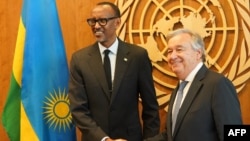This month, Rwanda marks 25 years since more than 800,000 mostly ethnic Tutsis and moderate Hutus were massacred in a vicious, three-month killing spree by extremist Hutus, following the downing of the president's airplane. At the United Nations, the international community paused Friday to commemorate the genocide and pay tribute to both the dead and the survivors.
Rwandan President Paul Kagame and U.N. Secretary-General António Guterres, along with two survivors, lit candles in the General Assembly hall. The U.N. chief said there were lessons to be learned from that dark moment in history.
'Dangerous trends'
"We must take a hard look at the present," he said. "As we renew our resolve to prevent such atrocities from ever happening again, we are seeing dangerous trends of rising xenophobia, racism and intolerance in many parts of the world. Particularly troubling is the current widespread proliferation of hate speech and incitement to violence."
During the 1994 genocide, massacres were often preceded by hate-filled speeches or radio broadcasts inciting violence.
Kagame said the act of remembrance also was an act of prevention.
"When genocide is dormant, it takes the form of denial and trivialization," he said. "Denial is an ideological foundation of genocide. Countering denial is essential for breaking the cycle and preventing any recurrence."
Revisionist efforts
He said efforts to rewrite the history of the genocide are "relentless" and increasingly mainstream.
The genocide is a stain on the history of the United Nations, which failed to act when warned it was imminent and pulled back peacekeepers as the situation escalated.
But the main message of Friday's commemoration was reconciliation and resilience.
Marcel Uwineza lost his father, two brothers, a sister and other relatives in the violence. He barely survived himself. Today he is a Jesuit Catholic priest.
"Later, I met the killer of my two brothers and sister," he said. "When I saw him I thought he was coming to kill me. As if in a movie, he knelt before me and asked [me] to forgive him. ... I took him, embraced him, and when finally I said, 'I forgive you,' I felt free."
A society reborn
Survivor Esther Mujawayo-Keiner said Rwandan society had to be reconstructed after the genocide because it had been broken.
And Rwandans have succeeded. Today, the country has one of the fastest-growing economies in central Africa, it is a regional leader in environmental sustainability, and more than 60% of its parliament seats are occupied by women.
Perhaps most significantly, no one is identified as Tutsi or a Hutu — they are all simply Rwandan.

